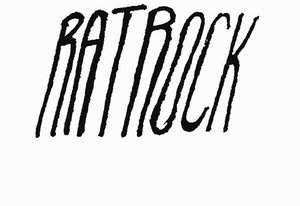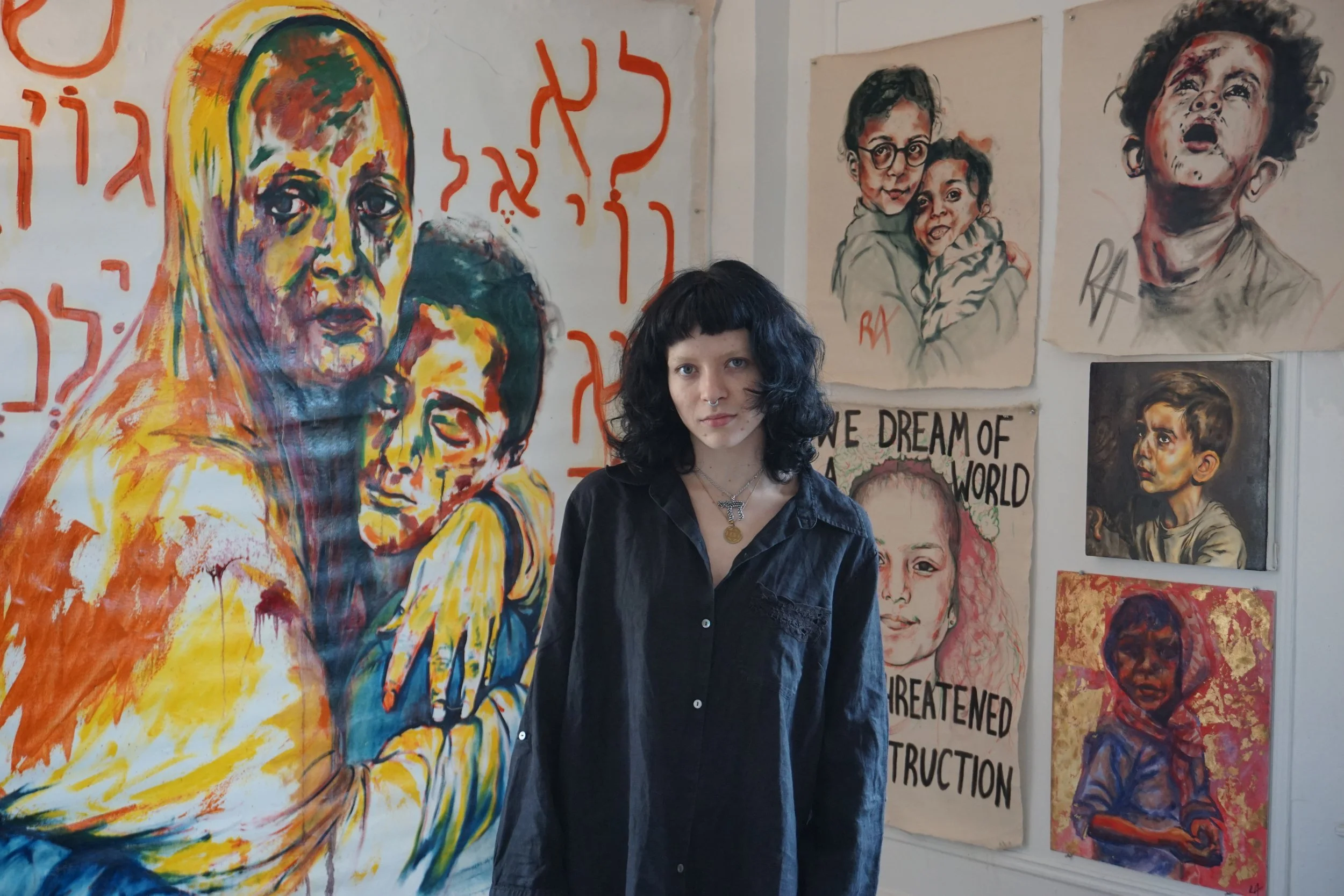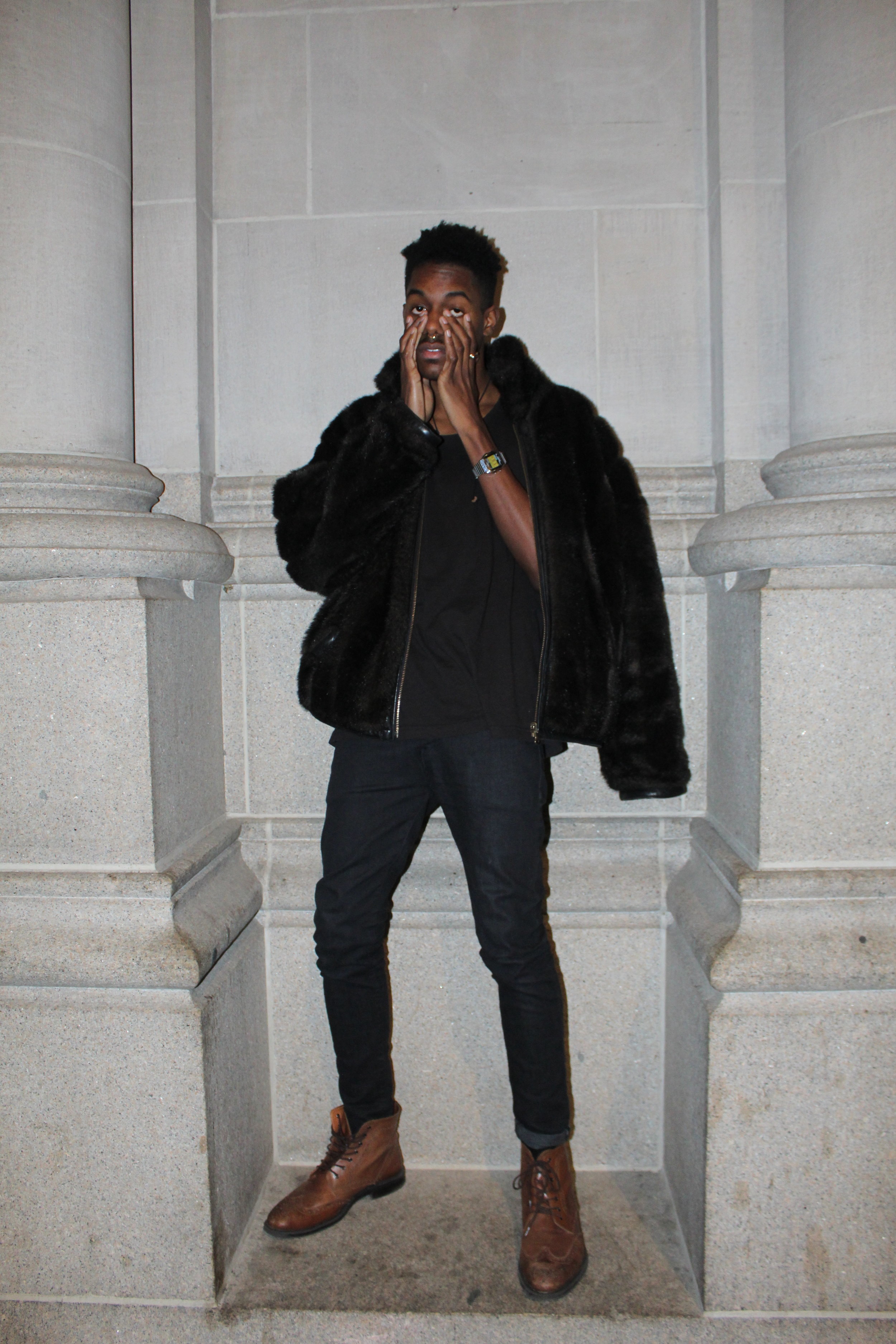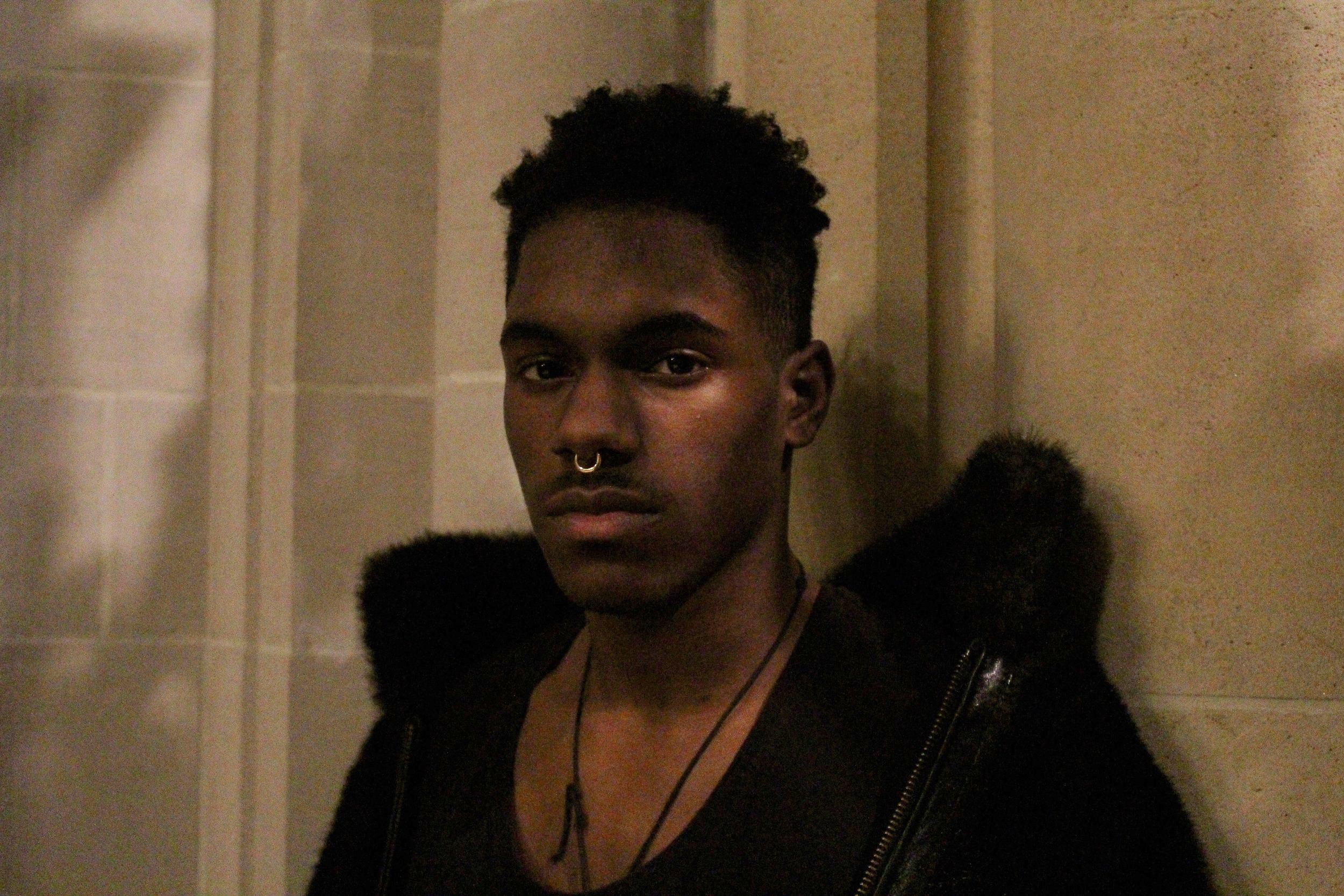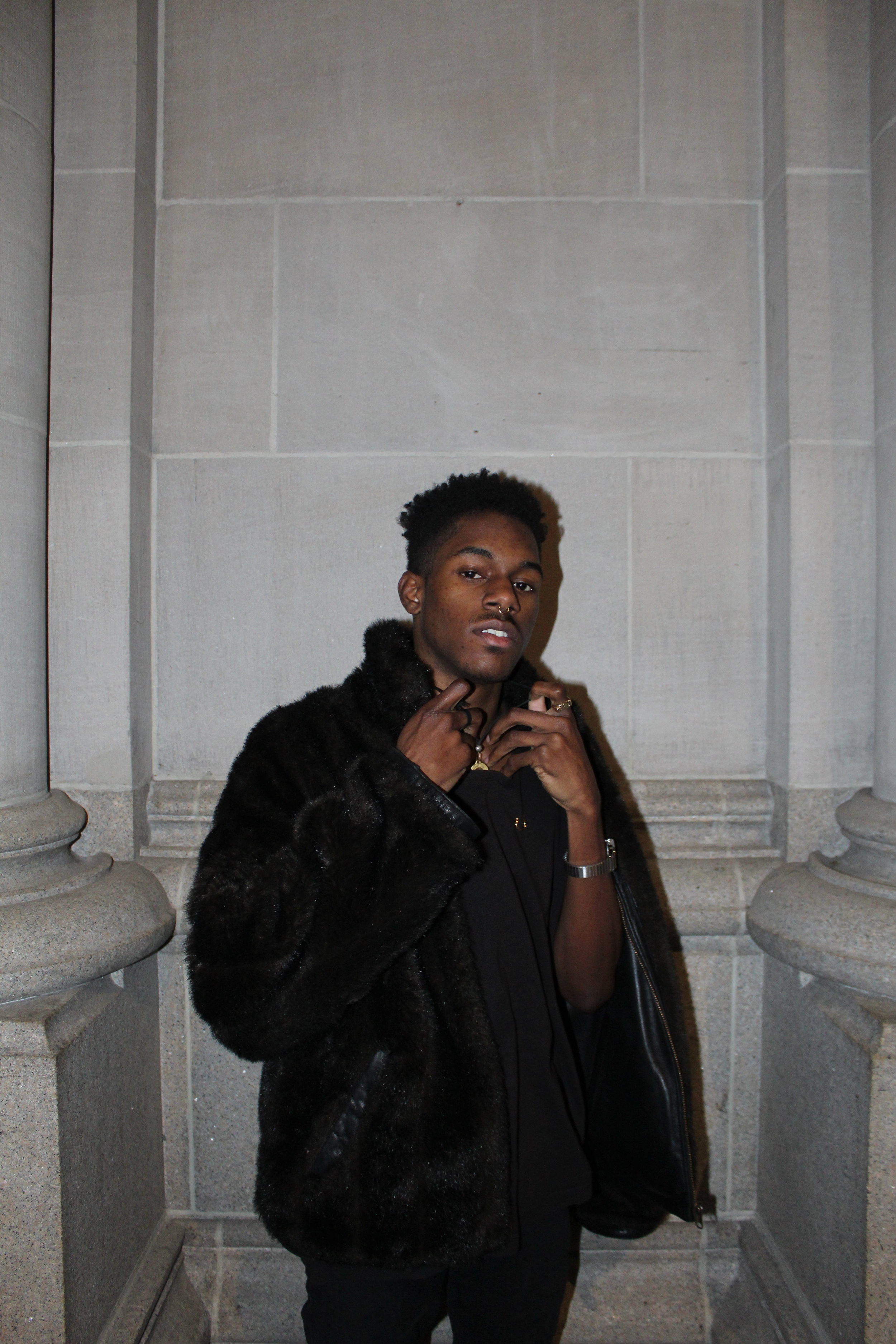Interview by Cecilia Lee
Anderson Peguero writes poetry and fiction. His work is emotive and concise, marked by a minimalism that was reflected in the head-to-toe black outfit he wore the day of his interview. Anderson was candid about the inspiration behind his art and his inner conflict about choosing to seriously pursue a career as a writer.
How would you go about describing your poetry to someone who’s never read it before?
My poetry is very modern, very visceral, kind of dark, kind of sad. I do prose writing most of the time and poetry is a way for me to be more evocative and more personal than writing fiction. My poetry is- I guess emotional is the right word.
Can you describe your writing process?
It’s entirely digital. I cannot write-I think I have a bad way of writing with my hand. I can’t write much without my hand getting tired so I do most of my creative writing on the computer. Sometimes when I’m walking around or at an event I’ll use my phone and I’ll just transfer it to my computer.
I noticed that there are spiritual elements in your poem “Malice”. How do you incorporate your own spirituality and faith into your poems?
I am not as spiritual as I should be, according to my family, but I guess in my writing, I sort of fall back on it as a vulnerability, like a wound that keeps opening when I’m writing. I can’t write a poem praising God or expressing what He’s done for me because I feel like that’s not the point of my poetry- it’s to show damages that I have had to get over, or showcasing them. I never write a poem expressly for the purpose of talking about God or being spiritual but it’s always in the back of my head, I think.
What’s your favorite poem and why?
Probably “Ash Wednesday” by T.S. Eliot. That was my final for my poetry seminar this semester. I like a lot of poems. I guess you could say one of my other favorites is “Paradise Lost”, by Milton. I realized my favorites always have a certain tone to them, but it’s not like a hymn or something, it’s something that sort of challenges one’s faith. And “Ash Wednesday” in particular, chronicles T.S. Eliot trying to find faith. It’s just one of the first poems that I really looked at critically, and I related to it spiritually, and it was interesting, and of course Eliot has really incredible word play.
What do you see is the relationship between poetry and music and lyrics?
I think poetry is very interesting because it can have music to it, a lyricism. I think Eliot’s really great at having his poetry have a music to it. But also, it can have no music quality to it, it can be completely discordant or chaotic and that even can be a kind of music, I’d say, to have no rhythm to yourself and be unpredictable. When I write my poetry, I almost never rhyme; I almost never try to make it lyrical. It may happen that it ends up like that, but it’s never on purpose and I kind of admire people who can do that because I absolutely cannot. In terms of finding poetry in music, I think that’s definitely possible. I listen to all kinds of music, sometimes for fun, sometimes for moods or whatever, but honestly I would say the sort of music I find the most lyrical meaning in would be like rock or metal music, especially the heavier or darker genres like black metal or like death metal, which everyone here is going to assume is screaming and all that but sometimes those bands are really deep. Sometimes I’ll listen to music because I like the sound, but then I’ll look at the lyrics too and they’ll be really interesting, insightful, and sometimes even inspiring. I like the fusion of things in genres.
What artists inspire you?
Writer-wise, I get inspired prose-wise by reading random books that are great and looking at different paragraphs and lines that are great; I write those down. But poetry-wise, I would say I’m influenced by modern spoken word poets. Safia Elhillo is really great, Sam Sax, I saw him for a little bit, it was great. But also in poetry I try to do- it’s obviously a written medium; it’s writing- but I try to be visual with how I do my poetry. I look at a lot of art. I look at a lot of past movements and sculptures. The poem about St. Peter actually came from me being in the Met. I saw this painting of St. Peter and I had that idea.
Themes about black identity and family are prevalent in poetry. How have your personal experiences shaped your poetry?
I think something that I’m vulnerable about with my poetry is that I feel like I don’t have enough personal experiences besides what has happened within my family. I’ve lived in military bases in a lot of places around the world so I’ve always felt disconnected from people struggling though hard core oppression. I’m aware of this oppression but I never really felt connected to that experience. The things that come out in my poetry are what I have experienced. Recently I’ve been trying to widen that a lot through varying themes and common structure of my poetry. I’ve been doing that since the summer with a lot of my pieces.
Could you elaborate a little bit more on what you’re doing to widen the scope of your pieces?
After the summer, I was researching different art movements and I was reading a lot of surreal fiction like the Gormenghast Novels by Mervyn Peake. I was reading short stories and was really interested by the surreal and the abstract. I’ve heard people say that my writing- my poetry- can be surreal almost, so I wanted to take that further and sort of develop a style. I came across this – it was on Wikipedia- it was just a bunch of random themes in modern black fiction and one was Afro-Surrealism. My favorite art movement besides that has been Italian Futurism for like years, so I had the idea of merging those and seeing where that could take me.
So I started working on something called Afro-Futurism and sort of moving past what I have experienced personally, and showing globalization. The theme of exploring the normal and modern life of blacks as a whole is like moving towards a futuristic society; like overemphasizing our need to stay current and be as good as every other race out there. So I’ve been expressing that with themes of machinery and industry in my recent poems and highlighting that sort of struggle to become one as a people with struggles we’ve gone through in the past.
How do you see poetry received and perceived among your peers compared to other forms of art?
Usually, at least in Columbia, I see way more poets and writers than I do other forms of art. I only know a handful- maybe this is my personal closure because I don’t have Facebook or anything. I only know a handful of visual artists but I know a lot of poets; I know a lot of people in the poet community and I feel like a lot of the people at Columbia have- not common backgrounds- but common interests and that’s sort of what brings them here to New York City. It has been a city for literature and writing for a long time so people are drawn to that. It’s definitely really supported here at Columbia. I feel like whether you are just starting out poetry or if you’ve been writing poetry for a long time, it’s really easy to get a nice support system and -I don’t want to say “fans”- but a lot of people who appreciate what you do here.
There’s obviously the literary magazine open mics that they have here, but there’s also all types of different clubs and events that happen across campus. And you’ll see the same people at some of them sometimes and they always love to hear what you write, even if you repeat the same things. So I think poetry is something that can definitely thrive at Columbia, and it is thriving and it’s just a medium that a lot of people want to experience. A lot of people come out to poetry slams for the first time at like every new open mic I go to.
Do you have a specific audience in mind for your poems?
That’s actually a good question because sometimes I feel like I’m writing, when it’s like really personal, I feel like I’ll write it and I write it with the intention of reading it to a specific person, or someone who just understands what I’m talking about. But then sometimes I will write just because I hear words in my head and I want to write this out and I’m like “man, this is a good line it’s gonna be great. My friends back in Georgia used to say I do remixes all the time because I would never read out anything until I’m there and I would always change words around as I’m reading it, because I’m like “oh, this works better here”. And sometimes I change words around depending on who I’m reading it to.
Are there any stereotypes about poetry that you’d like to challenge?
Yeah that’s interesting actually. In high school, before I started poetry, - I’ve been writing fiction my whole life, but I started poetry junior year of high school- I didn’t want to start earlier because I was afraid of people would be like “oh this kid writes poetry and he’s all sad and it’s so girly and pathetic” but actually once I started writing poetry, nobody said that to me. I’ve never had that happen to me, which I was surprised about; I still kind of am.
A lot of people, when you tell them that you write poetry, they’ll imagine something soft like “roses are red, violets are blue, it’s raining on my curtains”, and then on the other hand, a lot of people when they hear you’re a person of color doing poetry, they imagine you’re on a stage all the time telling people you need to “fight back against the like slave masters” and “your religion is not real”. I think that poetry is as versatile a medium as fiction writing. When you say you’re a writer, no one assumes you’re writing Twilight Part Two. So, I guess just freeing myself from the trappings of genres and what I look like; I write as a person.
Where do you see yourself and your projects in the future?
There’s two different answers. I see where I want to be in the future and then where I see myself being. Preferably, I want to be a writer full-time, probably fiction and poetry if possible, so I don’t know where I would be living or what I would be doing. But that’s just what I love to do, so I wish I could do that full-time. But then, with the way the economy is set up, that’s probably not very feasible, at least for now, so that’s why I’m here at Columbia studying biology. I’m going to major in that, get a job somewhere, do research somewhere, and then I’m not sure if I’m going to med school, because that’s like a fulltime thing and there’s no way I can write and project that career if I’m in medical school -that’s impossible.
Do you feel any pressure from the Columbia community to follow something that people would call more “practical”?
Actually, I feel the opposite. Everyone in Columbia that I tell I’m studying biology for a job they’re always like “what are you doing? No, you hate it- you should study writing- it’s what you want to do” and I’m like “that’s idealistic and it’s great but the reality is I have to feed myself”. Especially if I want to do creative stuff I have to be in a creative place like New York City, and that is not cheap; I can’t just work in a McDonald’s and live by myself like that.
And the pressure I do feel to do something practical comes from my family of course. My whole extended family is in the medical field and then growing up I got good grades in school all the time, so when that happens your parents are like “well, you’re a lawyer or a doctor that’s all you’re going to do” and I was like “I don’t really like lawyers”, so here I am. And I’ve brought it up to my mom before, I’ve been like “man I really like my poetry class; I love this image class” and she’s like “yeah I’m sure you do; that’s a great side hobby to have” and I’m like “I guess so”.
